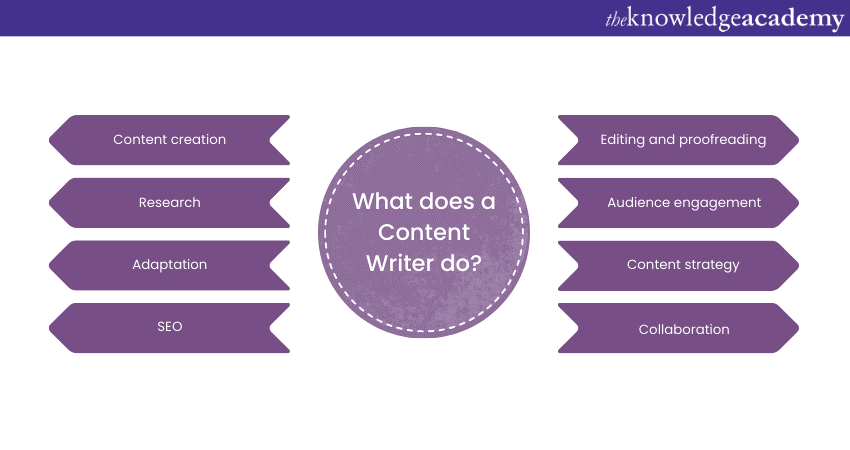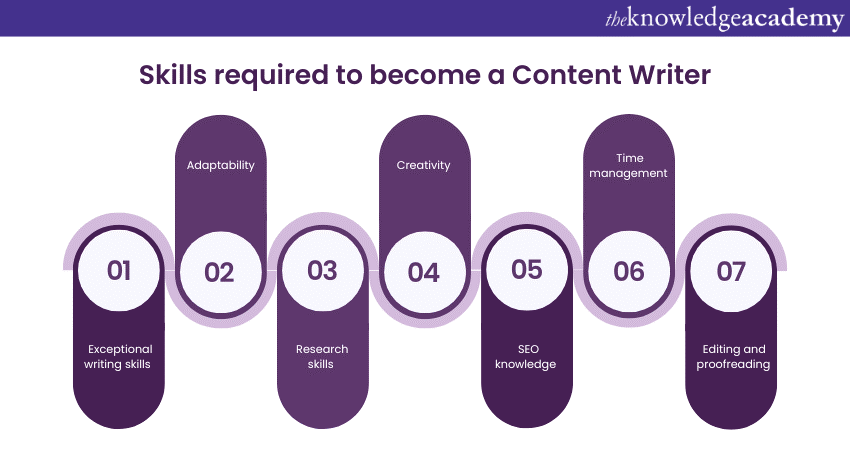We may not have the course you’re looking for. If you enquire or give us a call on +61 272026926 and speak to our training experts, we may still be able to help with your training requirements.
Training Outcomes Within Your Budget!
We ensure quality, budget-alignment, and timely delivery by our expert instructors.

Becoming a Content Writer is an exciting journey into the world of words, creativity, and digital storytelling. The rise of Digital Marketing has made the role of Content Writers even more meaningful today. If you've ever wondered how to become a Content Writer, you've arrived at the right place.
If you're a wordsmith looking to turn your passion into a profession or someone seeking a flexible and creative career path, keep reading. This blog will provide you with invaluable insights, step-by-step guidance, and essential tips on How to Become a Content Writer and the skills required to do so.
Table of Contents
1) Who is a Content Writer?
2) What does a Content Writer do?
3) Steps to become a Content Writer
4) Skills required to become a Content Writer
5) Content Writing jobs and salaries
6) Trends in Content Writing
7) Conclusion
Who is a Content Writer?
A Content Writer is a professional who specialises in creating written content for various mediums and purposes. Their primary role is to produce engaging, informative, and relevant text that caters to the specific needs and goals of their clients or target audience. Content Writers are skilled at crafting content for websites, blogs, social media, marketing materials, articles, and more. They play a crucial role in conveying information, telling stories, and communicating messages effectively through the written word. Content Writers need to have a strong command of language, grammar, and style, and they often research and adapt their writing to suit the tone and requirements of the platform or project they are working on. Their work contributes to building brand identity, engaging readers, and driving online visibility and success.
What does a Content Writer do?

A Content Writer is responsible for several critical tasks:
a) Content creation: Content Writers generate written material, which can include articles, blog posts, website copy, social media updates, product descriptions, and more. They produce content that is engaging, informative, and tailored to the target audience.
b) Research: To create accurate and well-informed content, Content Writers often conduct research on the topics they are writing about. This may involve gathering information from various sources, such as books, articles, interviews, and online research.
c) Adaptation: Content Writers can adapt their writing style to suit the specific needs and goals of a project or client. They may need to adhere to branding guidelines, tone, and style preferences.
d) SEO: Many Content Writers are skilled in search engine optimisation (SEO) techniques. They integrate relevant keywords and phrases into their content to improve search engine visibility.
e) Editing and proofreading: Content Writers review and edit their work to ensure it is free from grammatical errors and follows style and formatting guidelines.
f) Audience engagement: Their content is designed to captivate and engage readers. Content Writers strive to create material that is not only informative but also interesting and persuasive.
g) Content strategy: Some Content Writers are involved in developing content strategies, which can include creating an editorial calendar, identifying target audiences, and planning content for various platforms.
h) Collaboration: Content Writers often collaborate with other professionals, such as graphic designers, marketers, and subject matter experts, to ensure the content aligns with the overall goals of a project or campaign.
Elevate your content strategy with our Content Marketing Masterclass and unlock the keys to digital success!
Steps to become a Content Writer
Here are the essential steps to become a content writer:
Pursue relevant education
While a formal degree is not a strict requirement for Content Writing, it can be beneficial. Consider enrolling in courses or programs that focus on writing, journalism, marketing, and related fields. Many universities and online platforms offer courses that can enhance your writing skills. Additionally, courses in advertising and marketing can provide valuable insights into the strategies and techniques commonly used in content creation. For those interested in publishing content online, learning the basics of coding and website development can be beneficial, allowing you to publish content independently. Specialisation in a niche, such as law, healthcare, technology, or education, can also set you apart from other Content Writers. If you're already pursuing a degree, consider taking additional classes in these niche areas to develop a working understanding of them, which you can later apply to your Content Writing.
Create relevant work samples
As you begin your journey as a Content Writer, you may already have some writing experience that can serve as the foundation for your portfolio. This could include personal blog posts, articles, social media content, or even content you've created for friends, family, or organisations you're affiliated with. Collect and organise these samples as they demonstrate your ability to write effectively.
Compile your work samples
Once you've gathered a collection of work samples, it's important to compile them into a digital portfolio. Creating a professional website to display your examples can be a powerful way to showcase your skills. Organise your portfolio by content type or categorise it based on clients or projects. When describing your Content Writing experience, consider highlighting any content strategies you used, specific styles you've developed, or any client briefs where you had to meet specific content requirements. A digital portfolio is not only easier to share with potential employers but also allows you to continually update it with new work, which is particularly valuable as most marketing content is already in digital format.
Master the digital landscape with our comprehensive Digital Marketing Courses and take your career to the next level.
Develop a pitch
Crafting a compelling pitch is essential for securing Content Writing opportunities. Your pitch should be clear, personalised, and persuasive. Here's what you need in a practical pitch:
a) Subject line: Create a brief, personalised subject line that immediately conveys your email's purpose.
b) Personalisation: Address the recipient by their name to add a human touch and make your pitch more engaging.
c) Source mention: Explain where you found their content requirement or why you believe they need content, showcasing your understanding of their needs.
d) Your fit: Clearly articulate why you're the ideal candidate for the project or a valuable addition to their company. Highlight your skills, expertise, and relevant experiences.
e) Work examples: Share previous work and your portfolio to demonstrate your writing abilities and quality.
f) Online presence: Provide links to your blog, social media profiles, and professional platforms like LinkedIn or Upwork.
g) Email signature: Create a professional email signature with your contact information and portfolio links.
Apply for roles
To kickstart your Content Writing career, start applying for positions in different settings, such as in-house marketing departments, marketing agencies, or independent brands. Job boards, both online and offline, are excellent resources for finding open positions. Additionally, consider reaching out to brands or agencies you admire and inquire about potential job opportunities. When submitting your applications, be sure to include your resume, a compelling cover letter, and references alongside your portfolio. To maximise your chances of securing interviews, tailor your applications to emphasise your skills, experiences, and potential value to each prospective employer.
Explore freelance writing opportunities
If you're working for an agency or brand but want additional income or greater flexibility, freelancing can be a valuable avenue. Look for freelance writing opportunities by responding to calls for freelance writers posted online. You can also reach out to brands and organisations and inquire if they require Content Writing services. Freelancing is an excellent way to gain experience, expand your portfolio, and develop your writing skills further. It can serve as a bridge between your initial writing experiences and working with clients or employers directly.
Supercharge your digital prowess with our Digital Marketing Masterclass and revolutionise your online success!
Skills required to become a Content Writer

Here are the skills required to become a successful Content Writer:
1) Exceptional writing skills
Exceptional writing skills are the cornerstone of a successful Content Writer's toolkit. This skill encompasses a strong command of grammar, punctuation, and language conventions. Content Writers must convey their ideas with clarity and coherence, ensuring that readers easily understand the message. They create content that flows logically and engages the audience. A deep understanding of language nuances allows them to craft compelling narratives, persuasive copy, or informative articles. Content Writers also focus on the art of storytelling, enabling them to create content that captivates readers and establishes a connection with the material. Whether writing creatively or informatively, the ability to express ideas effectively through written words is paramount.
2) Adaptability
Adaptability is a key skill for Content Writers who often traverse various writing styles, tones, and subject matters. Versatility is essential, allowing them to seamlessly switch between different niches, industries, or target audiences. Content Writers must tailor their tone and style to suit the subject matter and the preferences of their readers. They can create formal, casual, technical, or creative content, depending on the context. Being adaptable also means embracing various content formats, from blog posts and social media updates to technical guides and marketing materials. It empowers Content Writers to cater to the diverse needs of clients and readers.
3) Research skills
Strong research skills are a fundamental requirement for Content Writers. These skills are instrumental in producing well-informed and credible content. Content Writers excel in information gathering, sourcing relevant data, and conducting thorough research to support their written work. This process involves identifying credible sources, extracting valuable insights, and attributing the information correctly within the content. Whether delving into scientific research, historical facts, or market trends, Content Writers use their research skills to present accurate and trustworthy content. Proper source citation is essential for maintaining the integrity and reliability of the content, ensuring that readers can trace the information back to its origins.
4) Creativity
Creativity is a driving force behind the success of Content Writers. It encompasses the ability to generate fresh and engaging ideas, headlines, and hooks that capture readers' attention. Content Writers leverage their creative mindset to make content stand out in a crowded digital landscape. Whether it's a captivating headline, a compelling story, or an imaginative metaphor, creativity adds a unique touch to the content. It allows writers to present information in a way that engages and resonates with the audience. Creativity isn't limited to artistic expression; it also extends to problem-solving. Content Writers often need to find creative solutions to writing challenges, such as presenting complex information in a user-friendly manner or crafting persuasive arguments.
Supercharge your online visibility and rankings with our SEO Masterclass – your gateway to digital supremacy! Join Today!
5) SEO knowledge
Search Engine Optimisation (SEO) knowledge is indispensable for Content Writers, especially those creating online content. It involves understanding how search engines work and how to optimise content for better visibility in search results. Content Writers delve into keyword research to identify the most relevant and effective keywords for a specific topic or industry. They seamlessly incorporate these keywords into their content to enhance their search engine visibility. Additionally, writers pay attention to on-page SEO, optimising meta descriptions, headers, and alt text for images. This knowledge enables content to rank higher in search engine results pages (SERPs) and reach a wider online audience. Content Writers strike a balance between creating valuable, reader-focused content and meeting the technical requirements of SEO.
6) Time management
Effective time management is critical for Content Writers, especially when juggling multiple projects and meeting tight deadlines. It's about efficiently planning and allocating time for research, writing, editing, and revisions. Content Writers often work on various assignments simultaneously, making time management a critical skill for ensuring that all tasks are completed on schedule. Meeting deadlines is not just a matter of professional responsibility; it's also about delivering content when it's most relevant to the audience.
7) Editing and proofreading
Editing and proofreading are the final stages of content creation. It involves reviewing your work to identify and correct errors in spelling, grammar, punctuation, and syntax. A keen eye for detail is crucial to ensure that the content is error-free, polished, and ready for publication. Effective self-editing helps maintain the professionalism and quality of the content. It's about more than just catching typos; it's about ensuring that the content is coherent, logically structured, and free from any language or formatting issues that could distract or confuse the reader.
Transform your marketing game with the Direct Marketing Masterclass and drive unparalleled results in your campaigns!
Content Writing jobs and salaries
Content Writing jobs offer a dynamic and fulfilling career path for those with a passion for the written word and the skill to craft compelling, informative, and engaging content. These roles involve the creation of content across a spectrum of mediums, including websites, blogs, social media, emails, and more.
One of the significant advantages of Content Writing jobs is the flexibility they offer. Professionals can choose to work as freelancers or remote employees, granting them the autonomy to manage their own schedules. In a digital landscape that constantly craves high-quality content, these jobs provide an avenue for creative expression, professional development, and the potential to wield the influential force of words.
Below is a table with the average salaries for Content Writers across the globe:
|
Country |
Average annual salary |
|
United States |
$57,000 |
|
Canada |
$60,000 |
|
United Kingdom |
£36,000 |
|
Australia |
$74,000 |
|
Singapore |
$48,000 |
|
United Arab Emirates |
AED 60,000 |
|
India |
₹500,000 |
Source: Indeed
Content platforms serve as a valuable springboard for aspiring writers to flex their creative muscles and produce content for a diverse range of clients. These platforms actively recruit writers to cover a wide array of topics. While writers might not have complete control over their clients, these platforms often offer lucrative compensation, making them an excellent launching pad for your Content Writing career.
Here are some noteworthy content platforms where budding writers can explore opportunities:
a) Fiverr
b) Zerys
c) Italics
d) Constant Content
e) Media Shower
f) Upwork
g) Write Access
Each of these platforms presents a unique landscape for writers to kickstart their journey and connect with clients seeking their valuable expertise. Whether you're a seasoned professional or just beginning, these platforms offer a thriving ecosystem for writers to thrive and showcase their writing talents.
Useful tools for Content Writers
Here are the top essential tools for Content Writers:
Grammarly
Grammarly is an indispensable tool for Content Writers. It goes beyond basic spell-checking and provides advanced grammar and style suggestions. Whether you're crafting an article, email, or social media post, Grammarly ensures your content is error-free and polished, maintaining a professional tone and clear communication.
Hemingway Editor
The Hemingway Editor simplifies and clarifies your writing. It highlights complex sentences, passive voice, and unnecessary adverbs, making your content more concise and reader-friendly. Hemingway's color-coded suggestions are a quick way to improve the readability and impact of your writing.
Google Docs
Google Docs is a versatile word processing tool that empowers Content Writers with real-time collaboration. It allows multiple users to work on a document simultaneously, making it a valuable choice for team projects. With its cloud-based storage and accessibility from anywhere, it simplifies content creation and sharing.
Evernote
Evernote is a Content Writer's digital notebook, perfect for organising ideas, research, and notes. It helps you stay structured and productive, offering the ability to save web clippings, images, and documents. With Evernote, you can seamlessly sync your work across devices and access your content whenever inspiration strikes.
Trello
Trello is a project management tool that aids Content Writers in organising tasks, ideas, and content calendars. Its visual boards, lists, and cards provide a user-friendly interface for planning and tracking work. Trello is particularly valuable for managing content workflows, assigning tasks, and maintaining an overview of ongoing projects.
CoSchedule Headline Analyser
Crafting compelling headlines is essential for capturing readers' attention. CoSchedule Headline Analyser is a valuable tool for optimising your headlines. It evaluates their quality, providing suggestions to enhance their engagement and SEO performance. With this tool, Content Writers can ensure their content grabs the audience's interest from the very start.
SEMrush Writing Assistant
SEMrush Writing Assistant is a valuable tool for Content Writers and Digital Marketers. It offers a comprehensive platform for optimising content and improving its search engine performance. With SEMrush Writing Assistant, you can conduct in-depth SEO research, analyse competitor content, and access real-time recommendations to enhance your writing. It helps you identify high-potential keywords, assess readability, and ensure your content aligns with the best SEO practices.
Transform your writing skills with our Copywriting Masterclass and create compelling content that captivates and converts!
Conclusion
Becoming a Content Writer requires passion, dedication, and continuous learning. By following the steps outlined in the blog, individuals can learn How to Become a Content Writer and unlock a world of creative expression, professional growth, and meaningful impact through the written word. If you aspire to craft compelling blog posts, engaging social media content, and informative articles, the path to becoming a Content Writer is within reach, ready to be explored and embraced.
Frequently Asked Questions
Upcoming Digital Marketing Resources Batches & Dates
Date
 Content Marketing Course
Content Marketing Course
Fri 17th Jan 2025
Fri 7th Mar 2025
Fri 23rd May 2025
Fri 18th Jul 2025
Fri 12th Sep 2025
Fri 14th Nov 2025
Fri 12th Dec 2025







 Top Rated Course
Top Rated Course



 If you wish to make any changes to your course, please
If you wish to make any changes to your course, please


